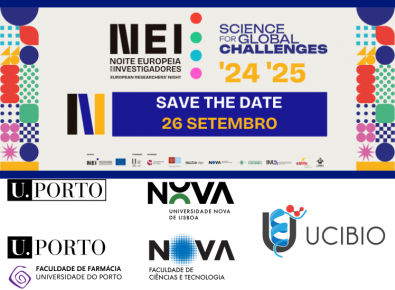
The European Researchers’ Night, a Europe-wide public event showcasing the diversity of science and its impact on citizens’ daily lives will take place on Friday, 26 September 2025.
Under the theme “Science for Global Challenges”, a wide range of free activities will take place designed to engage the public with research and innovation. In Lisbon, at the National Museum of Natural History and Science (MUHNAC), together with the Botanical Garden of Lisbon and the Jardim do Príncipe Real, and in Armamar, at the Armamar Municipal Sports Pavilion.
UCIBIO will take part in this initiative with several interactive activities led by its researchers, highlighting how biosciences contribute to addressing global challenges in sustainability, health, and the environment.
-
Transforming the World with Science: Circular Bioeconomy in Action and Proteins for a Sustainable Future
Visitors will discover how biotechnology gives waste a second life by transforming discarded materials into sustainable products, and how proteins produced in the laboratory can be applied to biomedicine and materials science. Activities include hands-on experiments with biopolymers and demonstrations of innovative tools such as an electronic nose for food freshness monitoring and disease detection. UCIBIO researchers will also showcase the national project “Proteios – Protein Tunable Materials for Non-Invasive Sensing” and the European projects “Agriloop – High-Value Products from Agricultural Residues through Sustainable Chains” and “UNMASK – Unraveling Parkinson’s Disease Diagnostic”, highlighting their contributions to sustainable biotechnology and biomedical innovation.
This activity directly relates to the theme Science for Global Challenges by showcasing how bioeconomy-based strategies contribute to economic and environmental sustainability, offering practical examples of solutions to reduce waste and promote circularity.
-
Portuguese Science for the Ocean: Innovation and Answers to Global Challenges
This activity explores the potential of marine biodiversity to inspire solutions for pressing societal problems. UCIBIO researchers will present their work on antibiotic resistance, natural products from marine organisms, and advanced biomedical tools that allow the study of proteins at the molecular level. These discoveries pave the way for new therapies, biosensors, and technologies supporting human health and environmental sustainability. The activity will also highlight the national project AASENS – Deciphering Arsenic and Antimony Detoxification Enzymes for Biosensor Application, which focuses on developing biosensors for environmental and health monitoring.
In line with the Science for Global Challenges theme, the activity highlights the crucial importance of the oceans, particularly for a country with an extensive Exclusive Economic Zone (EEZ). By demonstrating the role of marine biodiversity for ecology and biotechnology, with applications in biomedicine, this activity addresses the UN Sustainable Development Goals (SDGs) 3 (Good Health and Well-being), 6 (Clean Water and Sanitation), and 14 (Life Below Water).
-
Invisible Heroes of Science: Molecules that Change the World
Participants will be invited to enter the microscopic world of proteins, enzymes, and glycans, and learn how these molecules shape health and the environment. Through interactive experiments and demonstrations, the activity will show how cutting-edge research contributes to combating infections, pollution, and cancer. UCIBIO researchers will also present the national project “CuMIT – Unique Copper Cluster in the Mitigation of Greenhouse Gas”, as well as the European projects “CryoEM@NOVA – A Cryo-Electron Microscopy Hub Enabling Drug Discovery”, “EuroMicropH – Understanding and Exploiting the Impacts of Low pH on Micro-Organisms", and “GLYCOTwinning – Building Networks to Excel in Glycoscience”, highlighting collaborative efforts in biosciences, drug discovery, and environmental solutions.
This activity is directly aligned with Science for Global Challenges, presenting frontier scientific research on antimicrobial resistance, human health, environmental sustainability, and climate change. By addressing global threats such as resistant bacteria and greenhouse gas emissions, and by showcasing innovations like enzyme-based climate solutions and glycan-focused biomedical research, the activity illustrates how molecular biosciences can contribute to the development of next-generation therapies and environmental protection strategies.
The European Researchers’ Night in Lisbon is organised by the Science for Global Challenges (SCIGLO) consortium, coordinated by the University of Lisbon through MUHNAC, with the participation of several academic and institutional partners, including NOVA University Lisbon.
See the full program: Here
-
MicroMundo Project
In Armamar, Filipa Grosso from the BacT-Drugs lab, Faculty of Pharmacy of the University of Porto, will coordinate an Interactive Science Station offering a condensed version of the MicroMundo project’s laboratory steps.
See the full program: Here
